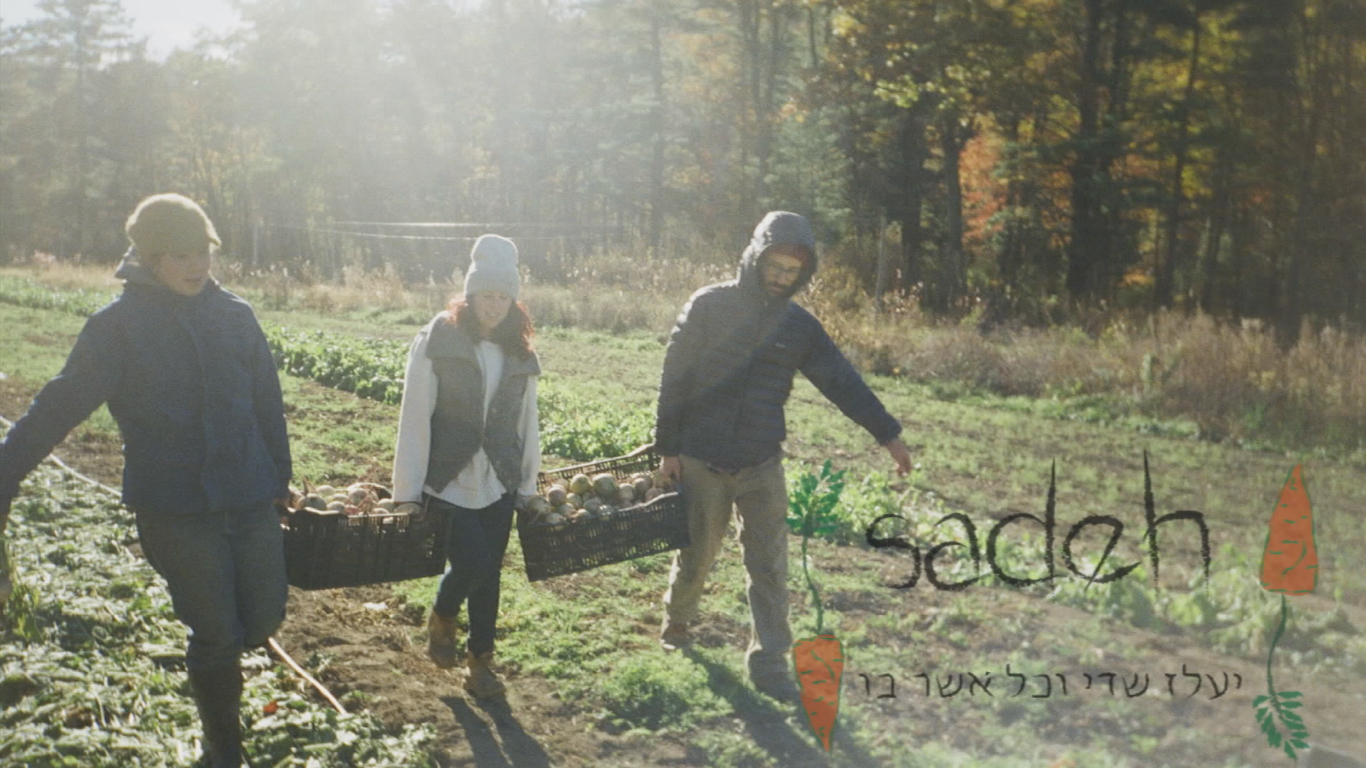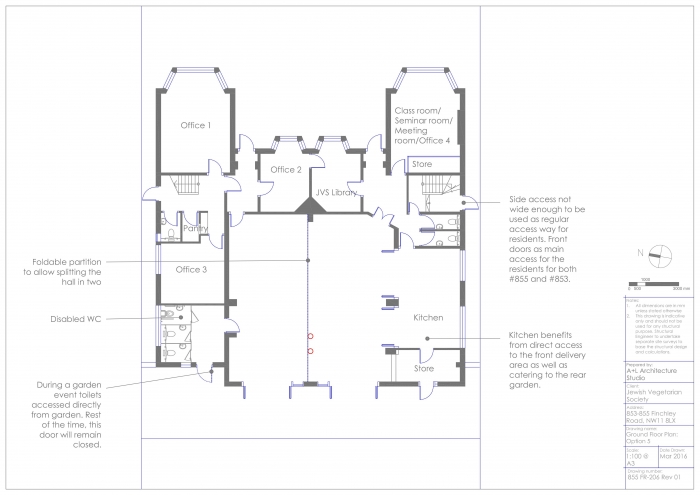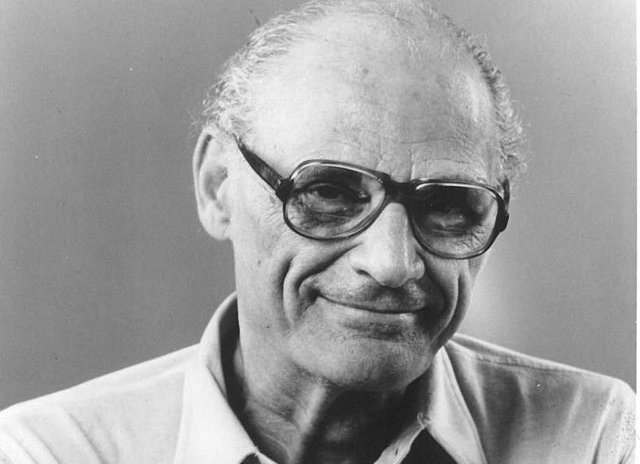At a time when Trump can declare Jerusalem to be the Jewish capital, accusations of antisemitism plague the Labour Party, and negative feelings towards Israel rise, this solo performance from Avital Raz feels very timely indeed. My Jerusalem is a politically charged tale of a drunken…
Kicking out antisemitism at Chelsea FC
A letter from JR's editor
Thoughts on the centenary of artist Charlotte Salomon
Yesterday, Sunday 16 April, marked Charlotte Salomon’s centenary. I find myself imagining what the trajectory of her life – and art – might have been had she survived the Holocaust. Would she have rebuilt her life and perhaps settled in Amsterdam, where her parents had taken refuge during the war, and raised a family with her husband, fellow refugee Alexander Nagler? Would she have gone on to become a well-known artist and perhaps a grandmother and great-grandmother, founding a dynasty of artists? Perhaps she would now be celebrating her centenary. Her stepmother, the renowned mezzo soprano Paula Salomon-Lindberg, lived to celebrate hers, dying at the age of 102 in the year 2000.
Sadly this is idle speculation. The reality is that her achievement by the age of 26 stands as unique and extraordinary: the series of 765 autobiographical gouaches that make up her artwork Life? or Theatre?, which you can see for the first time in full from this October at the Jewish Historical Museum, Amsterdam.
The proof of her enduring fascination and the inspiration she continues to provide can be seen from this June in the performances of Charlotte – A Tri-Coloured Play with Music, in Canada and beyond, as its creators told me in the April 2017 issue of Jewish Renaissance.
Details and links to the exhibition of Life? Or Theatre? and performances of Charlotte - A Tricoloured Play with Music are below and I know that this year, and every year, Charlotte Salomon will continue to gain new admirers.
By Judi Herman
An exhibition of Charlotte Salomon’s artwork Life? Or Theatre? will be shown for the first time in full at the Jewish Historical Museum, Amsterdam, from 25 October to 25 March 2018. www.jck.nl.
Charlotte – A Tri-Coloured Play with Music will be featured in two Canadian Festivals this June. The Human Rights Arts Festival in Kingston, 1 June, and Luminato Festival, Toronto, 16-18 June. Then from 30 June to 2 July at World Stage Design Festival Experimental Theatre in Taipei, Taiwan.
Visit www.theaturtle.com for other upcoming performances.
Allons enfants de la Patrie! France during and after WWII provides fertile soil for rich drama, music and art this year
 What links London’s latest hit musical An American in Paris, a revival of Incident in Vichy – an Arthur Miller drama not seen in this country for 50 years – and the centenary of the young German artist Charlotte Salomon, who continues to enchant more than 70 years after she perished in the Holocaust?
What links London’s latest hit musical An American in Paris, a revival of Incident in Vichy – an Arthur Miller drama not seen in this country for 50 years – and the centenary of the young German artist Charlotte Salomon, who continues to enchant more than 70 years after she perished in the Holocaust?
The clue is in the titles of the theatre pieces. Arthur Miller's Incident in Vichy concerns the fate of 10 men detained in Vichy, France, at the height of World War II in 1942, when Vichy became notoriously synonymous with the French government of Marshal Pétain that collaborated with the Nazis. An American in Paris, freshly adapted from the much-loved Gershwin movie musical, is reimagined with a story set in the City of Light in 1945, in the immediate aftermath of the war. The heroine is a young Jewish ballerina safely hidden by Parisians, while her parents have disappeared in wartime Provence. And the young German artist Charlotte Salomon, escaping Nazi Germany to take refuge in the South of France, was herself arrested in Villefranche in September 1943 aged just 26 – within a month she had been murdered on arrival in Auschwitz.
Salomon was born 100 years ago this April and in the April edition of Jewish Renaissance, which will reach subscribers just before Passover, I explore the continuing allure of her life and work as expressed in the 765 autobiographical series of gouaches that make up her Life? Or Theatre?, in the company of the co-creators of a new play with music telling her story "in three dimensions".
I have just had the good fortune to marvel at the glorious evocation of the newly-liberated City of Light in American in Paris – a show that adds depth to the light-as-air story of the much-loved film musical without losing any of its charm and vitality, thanks to a fresh plot with Jewish protagonists at its heart. Find out more in my American in Paris review.
My most recent review is of an extraordinarily well-cast and tightly-directed revival of Arthur Miller's Incident at Vichy. The production successfully ratchets up the tension of Miller’s 90-minute morality play examining the different responses and fates of those 10 men picked off the streets of Vichy by a Nazi regime intent on rounding up Jews for deportation. It continues at London's Finborough Theatre until Saturday 22 April.
By Judi Herman
Click here to read all of our theatre reviews.
Help fund the UK's first ever Jewish farm
 Next month Sadeh Farm in Kent is set to open its gates. This may not seem like news in itself, but Sadeh (field in Hebrew) is a unique kind of farm: a Jewish farm. Founded by Talia Chain and co, who have already begun work in the grounds of Skeet Hill House, Sadeh aims to reconnect people with their faiths and each other by working together on the land to grow vegetables. "Here Jewish people of all ages and backgrounds can connect with our rich tradition of Jewish farming and be inspired by a religion based in agriculture," they promise in their mission statement. While the group are almost set up, they still need financial help to acquire polytunnels, sheds, tools, marketing and legal help and more. Visit their Chuffed crowd-funding page for more info and to donate.
Next month Sadeh Farm in Kent is set to open its gates. This may not seem like news in itself, but Sadeh (field in Hebrew) is a unique kind of farm: a Jewish farm. Founded by Talia Chain and co, who have already begun work in the grounds of Skeet Hill House, Sadeh aims to reconnect people with their faiths and each other by working together on the land to grow vegetables. "Here Jewish people of all ages and backgrounds can connect with our rich tradition of Jewish farming and be inspired by a religion based in agriculture," they promise in their mission statement. While the group are almost set up, they still need financial help to acquire polytunnels, sheds, tools, marketing and legal help and more. Visit their Chuffed crowd-funding page for more info and to donate.
By Danielle Goldstein
Help raise funds for a new Jewish vegetarian centre in Golders Green
The Jewish Vegetarian Society has launched a crowdfunding campaign to open the UK’s first vegan and vegetarian community centre at its headquarters in Finchley Road this autumn.
Vegetarians, non-vegetarians and people of all faiths and none will all be able to enjoy the eco-friendly centre’s open-plan hall, community garden and demonstration kitchen where a number of cookery classes will take place. Other events planned include film screenings, workshops and talks.
Having first started in 1966 by a group of plucky Jewish vegetarians, the JVS has been going strong ever since. JVS director Lara Smallman said: “This is a very exciting time for the JVS as we embark upon a new chapter. We are delighted to be creating a home for vegetarianism and environmentalism.”
By Danielle Goldstein
Donate to JVS via tinyurl.com/newjvscentre and see an architect’s drawing of the proposed layout below:
Don't miss Arthur Miller season on BBC Radio 3, 4 and 4 Extra
This month BBC Radio has joined in the celebrations of Arthur Miller’s centenary (he was born 17 October 1915) with a terrific season of dramas and documentaries exploring his life and work on Radio 3, 4 and 4 Extra – including the broadcast world premiere of The Hook, which had its world premiere on the stage earlier this year, as reported in Jewish Renaissance. Read on for all the necessary details, and if you miss/have missed any of the programmes, they will be available on BBC iPlayer for a month after broadcast.
Coming up this Saturday 17 October on Radio 4…
2.30-4.15pm Unmade Movies: Arthur Miller's The Hook The world broadcast premiere of Arthur Miller's unproduced screenplay tells the story of a 1950s Brooklyn longshoreman who is fired for standing up to his corrupt union boss, but decides to fight back by standing for union president.
8-9pm Archive on 4: Attention Must Be Paid – Arthur Miller's Centenary "Attention must be paid to such a person," says Linda of Willy Loman in Arthur Miller's 'Death of a Salesman'. Miller himself spent his long life paying close attention to the society and times in lived in. He scrutinised the American Dream in 'Salesman', in 'The Crucible' revealed its hysteria and in 'All My Sons' its corruption. One hundred years, to the day, after the birth of Arthur Miller his biographer, Christopher Bigsby, mines the BBC's and his own archives, tracing the life and work of this towering American figure. There are contributions from Dustin Hoffman, Warren Mitchell and Brian Dennehy, who all played Willy Loman, and Ying Ruocheng, who played the role in Beijing. Henry Goodman speaks about working on his late play, 'Broken Glass'. We hear from Harold Pinter, Nicholas Hytner and John Malkovich. And there is previously unbroadcast material from Miller's brother and sister, and his wife, the photographer, Inge Morath.
Still available to catch up on…
The Essay: Staging Arthur Miller on Radio 3 To mark the centenary of Arthur Miller's birth (17th October 1915), in five 15-minute programmes on Radio 3, playwrights, directors and an actor, reflect on what his work means to them and describe their personal connection with the playwright and his work. They are first broadcast from Monday to Friday 12 to 16 October at 10.45pm
The Life and Times of Arthur Miller on Radio 4 Four 45-minute biographical dramas broadcast in Radio 4’s Afternoon Drama slot from 12 to 15 October
Fame on Radio 4 Extra three short stories by Miller under the title ‘Fame’ on Radio 4 Extra
Arthur Miller: The Accidental Musical Collector on Radio 4 Extra Playwright Arthur Miller taped Blues and spiritual songs of North Carolina's poor in 1941. With Christopher Bigsby. From February 2005.
Playing the Salesman on Radio 4 Extra Christopher Bigsby analyses the role of Willy Loman, the central character in Arthur Miller's Death of a Salesman. Contributors include Dustin Hoffman, Warren Mitchell, Brian Dennehy and Alun Armstrong, all of whom have played the role.
By Judi Herman
Geraldine Auerbach reports on the tragic death of two giant figures in Britain's Jewish music scene
 © Complete Music and the Brickman family via Times Union
© Complete Music and the Brickman family via Times Union
Composer Ronald Senator and his wife, pianist Miriam Brickman, tragically died in a fire in their home in Yonkers, New York on Thursday 30 April. Geraldine Auerbach, the founder of the Jewish Music Institute in London, explains how important they were in the world of Jewish music in Britain.
I am not sure how I first met Miriam and Ronnie Senator – but they were pivotal to the first Bnai Brith Jewish Music Festivals. Miriam was a real catalyst, putting (or pulling) ideas, people and programmes together in most creative ways that always led to something special and to lasting and developing relationships. She would always come up with something innovative and spectacular.
To the very first festival on 24 June 1984 she brought a super chamber concert in the Purcell Room with herself on piano and Stanley and Naomi Drucker, clarinettists from the New York Philharmonic, and her friends Sybil Michelow and Malcolm Williamson who had formed a piano and voice duo. For the second festival in 1986 she brought another chamber concert, which included bassoon and viola players from the Nash Ensemble. The programmes were always exciting, introducing new works of Jewish interest by new composers and as always, there were pieces by Ronnie Senator in the concert.
Miriam also brought me something much more remarkable. It was Ronnie Senators' 'Kaddish for Terezin’, a huge oratorio he had written in memory of his first wife who had been incarcerated in Auschwitz. It involved an orchestra, choir and children’s choir, a cantor and a narrator. Something much bigger than I had ever contemplated. But I thought it was important – and, impressed by her enthusiasm, I was inspired to make it happen – in a special setting. The Director of CCJ, the wonderful Rev Marcus Braybrooke suggested it could be ideal for Canterbury Cathedral – and that he would broach the subject with the Dean, with whom he was having lunch next day. It transpired that the Deanery in Canterbury had housed Jewish refugees and that he had wanted a Holocaust memorial (but not a statue) so this fitted the bill.
That set the most amazing activities in motion. Malcolm Singer stepped up to the podium to provide and conduct the orchestra and choirs and had a friend with a superb children’s choir. I felt Rabbi Hugo Gryn, who himself had been in Terezin, should be the narrator. Louis Berkman cantor of Belsize Square – the synagogue created by Holocaust survivors or escapees – should be the soloist. This amazing premiere was broadcast live on BBC Radio London with interviews with Hugo and other survivors during the interval.
But that wasn't all. When Dr David Bloch, of Tel Aviv University, who was presenting a concert of Israeli contemporary music at the festival, heard about the Terezin Project and suggested we invite two musicians – pianist Edith Kraus from Israel and bassist Karel Berman from the Prague National Opera – who had last performed together in Terezin. He suggested an amazing film of music in Terezín for us to show and also suggested we invite Josa Karas who had just published a book about it. All of which we did.
And so it was that all day while Jewish choirs and a cantor and Rabbi rehearsed in Hebrew and blew a shofar in the Cathedral, the film was showing over and over in the school hall – and recitals (two of them) took place in the recital hall – which just happened to be the old Synagogue in Canterbury. Then after a reception in the Chapter House with the Archbishop of Canterbury the cathedral was filled with Jews and Christians listening to Ronald Senator’s Holocaust Oratorio. A film was made of the day focusing on Edith and Karel and shown on national television on Remembrance Sunday in November 1986, which also happened to be the commemoration of Kristallnacht.
With this auspicious beginning, Miriam went on to have performances of Ronnie’s Kaddish for Terezin mounted in other special places such as St John the Devine in New York, the Vatican in Rome and in Terezin itself.
It was not only the heavy stuff. For the next Festival in 1988 Miriam brought Klezmer to the UK. She introduced me to Giora Feidman the astonishing clarinettist who wowed London at the Logan Hall then and again in 1990, as well as in later festivals. In the ’88 festival Miriam also put together another innovative chamber concert, this time called Echoes of Jewish Poland at St John's, Smith Square with Sybil singing as well as Simon Fisher on Violin, Antonio Lysy on cello and Rivka Golani on viola, who premiered Ronald Senator’s Dance Suite for viola solo.
It was also in 1988 that Miriam introduced me to Isabelle Ganz who delighted everyone with her group Alhambra in a concert of Sephardi Life Cycle songs at the Almeida Theatre and presented the delightful Sacred and Secular music of the Sephardi Jews at the Purcell Room, Supported by Nitza and Robin Spiro.
It was always exciting to be in the presence of Miriam and Ronnie. Especially Miriam, who was so enthusiastic and brimming over with ideas and suggestions that were helpful to all.
Miriam Brickman and Ronnie Senator brought true riches in Jewish music and musicians to greatly enhance the Bnai Brith Jewish Music Festivals and thus Jewish music in the UK. The last time that Miriam and Ronnie were with us I think was at the Bloch Conference in Cambridge in 2007 where she performed in the concert.
They were always together – flitting between homes in London and New York – often catching a lift on the QE2 where Miriam would entertain on the piano and Ronnie would give lectures that enthralled the passengers. He was 89 and Miriam 81. Their health was failing. Despite this shocking news of the fire at their home, there may be something comforting or poignant that in their last moments they were also as one, and like Elijah were taken together up to heaven in a fiery embrace. Always innovative and spectacular.
New issue out now! It's that time again, and this month we've got politics on the brain…
 With the General Election now officially underway, we have politics on our minds – in all its forms – for our April issue. From the revolutionary Yiddish poets who fired up the streets of East London, to the current crop of social activists who are committed to making the world a better place today. As our pieces show, there is an irrevocable link between Jews and political activism.
With the General Election now officially underway, we have politics on our minds – in all its forms – for our April issue. From the revolutionary Yiddish poets who fired up the streets of East London, to the current crop of social activists who are committed to making the world a better place today. As our pieces show, there is an irrevocable link between Jews and political activism.
We also have an essay on Jewish voting patterns by Geoffrey Alderman; a discussion on the ethics of the ‘right to offend’ by Brian Klug, and a personal reflection by associate Times editor Daniel Finkelstein on whether being Jewish really matters when it comes to casting your vote. There’s a piece from Paris three months after the terrorist attacks there by a former Le Monde senior editor, Sylvain Cypel, and a piece by Dan Carrier about his great uncle Nat – one of the first English speakers to fire a shot in the Spanish Civil War. But if you’ve had enough of politics (already!) don’t despair, there’s plenty to keep you reading.
We’re celebrating two centenaries: one with the chair of the Ben Uri museum, David Glasser, who tells us how he rose from the mean streets of Glasgow to head one of the most exciting art venues in Europe; and on the eve of the Arthur Miller centenary, we’re asking why are there no Jews in the plays of one of the 20th-century's greatest Jewish playwrights? There’s also klezmer from Leeds boys Tantz, an interview with new Israeli novelist Ayelet Gundar-Goshen and a report from the place to be on a Tuesday night in Manchester: the Menorah Film Club. Plus three month’s of cultural listings for the UK and abroad. With all that going on – don’t forget to vote!
By Rebecca Taylor








